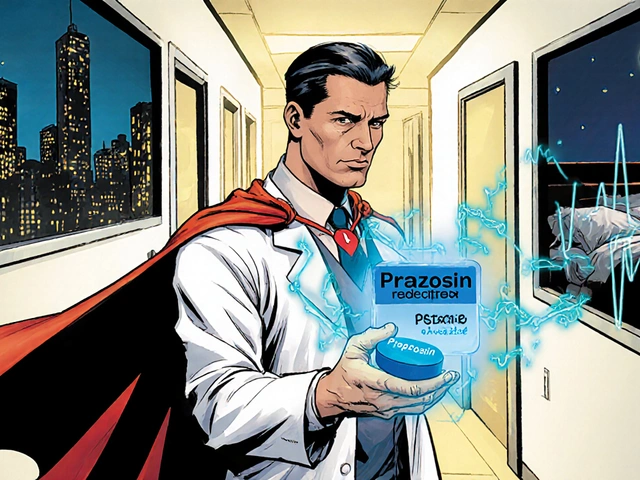If you've been prescribed losartan-hydrochlorothiazide, you might wonder how it could affect your sleep. This combo medication helps manage high blood pressure, and understanding how it interacts with your body is key. It's not just about lowering numbers on a blood pressure monitor; it can influence your sleep patterns too.
Some people have reported feeling more fatigued or facing sleep disturbances after starting on losartan-hydrochlorothiazide. Why's that? Well, part of it has to do with the body's response to medication. These drugs can alter fluid balance and blood circulation, sometimes leaving you tossing and turning at night.
But don't worry; we'll break it down in this piece. You'll find practical tips on how to adjust daily habits to improve your night's rest while sticking to your medication schedule. Small lifestyle tweaks can go a long way, helping you feel more energetic during the day and relaxed when it's time to hit the hay.
- What is Losartan-Hydrochlorothiazide?
- Common Side Effects and Sleep
- Managing Sleep While on Medication
- Lifestyle Tips for Better Sleep
What is Losartan-Hydrochlorothiazide?
Losartan-Hydrochlorothiazide combines two medications in one pill, each playing a unique role in controlling high blood pressure. This combo is often prescribed when a single medication doesn’t effectively manage your blood pressure—the silent condition that could lead to serious health issues if left unchecked.
Breaking Down the Components
Losartan, a part of a drug class called angiotensin II receptor blockers (ARBs), works by relaxing blood vessels. It allows blood to flow more easily, thereby lowering blood pressure. It's helpful for reducing the risk of strokes—especially in folks with heart disease risks.
Hydrochlorothiazide is a type of water pill or diuretic. It helps the body get rid of excess salt and water by increasing urine production. It's what kidneys do, just sped up, and it further helps to bring blood pressure down.
How Does It Work Together?
Combining losartan and hydrochlorothiazide creates a more effective treatment than each drug could achieve alone. You're essentially targeting the issue of high blood pressure from two angles: by widening blood vessels and flushing out unnecessary fluids.
Prescribing the Combo
This medication is generally safe, but it’s not for everyone. Doctors usually reserve it for those who haven't found success with single-drug therapy. Plus, it’s vital to monitor kidney function and electrolytes while on this medication. Your doctor will probably set you up with regular blood tests to ensure everything stays on track.
| Components | Function |
|---|---|
| Losartan | Relaxes blood vessels, lowers blood pressure |
| Hydrochlorothiazide | Increases urine production, reduces blood pressure by eliminating excess water |
Understanding how losartan-hydrochlorothiazide checks high blood pressure can reinforce the importance of sticking to your prescription. Keep in touch with your healthcare provider to ensure your treatment remains effective and adjust plans if needed.
Common Side Effects and Sleep
Taking losartan-hydrochlorothiazide is generally meant to help you stay healthy by keeping blood pressure in check. But like many medications, it can come with a few side effects, and sleep issues often sneak onto that list. So, what could be going on?
Feeling Fatigued or Weary?
Many people on losartan or hydrochlorothiazide report feeling more tired than usual. This fatigue can be a direct result of how these meds affect your body's fluid balance and blood pressure levels. While your heart has less pressure to pump against, it might leave you feeling like you're in a bit of a fog during the day, which can then mess with your sleep at night.
Stomach Discomfort
Nausea or upset stomach is a common woe with many meds, including this one. This can lead to tossing and turning at night if you're dealing with discomfort when you try to sleep. Combined with the fatigue, it can create a cycle of sleep disruption.
Changes in Potassium Levels
A fun twist about hydrochlorothiazide is that it can mess with your potassium. You might experience muscle cramps or weakness if your potassium drops too low, disturbing your sleep. Weirdly, either too much or too little potassium can keep you awake!
Keeping Hydrated
While the medication helps by pulling extra fluid from the body, it means you'll probably pee more often. Unfortunately, this can disrupt your Zzz's if you're making bathroom runs more frequently, especially during the night.
Stats Worth Knowing
| Side Effect | Frequency (%) |
|---|---|
| Fatigue | 10-20% |
| Dizziness | 15-30% |
If sleep disturbances continue or bother you, it can be wise to chat with your doctor. Sometimes adjustments in timing or dosage make a big difference. Staying well-hydrated during the day and cutting back on caffeine can also improve nighttime rest.

Managing Sleep While on Medication
Navigating sleep can be tricky if you're taking losartan-hydrochlorothiazide. But fear not, there are strategies to help you rest better while managing your blood pressure. Let's run through some ideas.
Stick to a Routine
Keeping a regular sleep schedule can work wonders. Try to hit the bed and wake up at the same time every day, even on weekends. This might sound simple, but it reinforces your body's natural clock, making it easier to fall asleep and wake up refreshed.
Watch Your Diet
What you eat can impact your sleep quality. Avoid heavy meals, caffeine, and alcohol close to bedtime. Instead, focus on a balanced diet with plenty of fruits, veggies, and lean proteins to keep your energy up without the evening jitters.
Stay Active, But Not Too Late
Exercise is great for sleep, but timing is key. Aim to complete workouts at least a few hours before bed. This gives your body time to wind down, so you're not feeling restless as you try to doze off.
Manage Stress
Stress and sleep don't mix well. Practices like yoga, meditation, or even a relaxing bath can help calm your mind. Giving your brain a chance to chill out can make drift-off time come easier.
Talk to Your Doctor
If sleep problems persist, it's wise to bring it up with your doctor. Sometimes tweaking medication timing or exploring other remedial measures can alleviate disruptions.
Understanding how losartan-hydrochlorothiazide could affect your sleep gives you a head start in managing it effectively. It's these little choices - like diet tweaks, routine, and exercise - that can pave your way to restful nights.
Lifestyle Tips for Better Sleep
Getting a good night's sleep can be tricky when you're on medications like losartan and hydrochlorothiazide. But, a few lifestyle tweaks might make a big difference. Let's dive into some practical tips that could help you catch those Zs.
Consistent Sleep Schedule
Keeping a regular sleep schedule can help set your body's internal clock. Try going to bed and waking up at the same time every day, even on weekends. Your body will thank you.
Create a Relaxing Bedtime Routine
Your pre-sleep activities impact your slumber. Consider winding down with a good book or gentle stretches. Avoiding screens at least an hour before bed can also aid in drifting off faster because the blue light from devices can interfere with the production of sleep hormones.
Watch What You Eat and Drink
Caffeine and heavy meals can keep you up at night. Try to stay away from food and drinks that interfere with sleep, especially in the hours leading up to bedtime. If you're thirsty, a glass of warm milk or caffeine-free tea can soothe you.
Exercise Regularly
Regular physical activity can enhance both sleep quality and duration. Aim for at least 30 minutes of activity most days, but not too close to bedtime where it might have the opposite effect.
Manage Stress Levels
Stress can be a sleep killer. Techniques like meditation, deep breathing, or gentle yoga can help you unwind before turning in, promoting a more restful sleep.
A quick look at some habits that work:
- Keep your bedroom cool, quiet, and dark for optimal sleep conditions.
- Opt for white noise machines if outside noises are a problem.
- Use your bed only for sleep and intimacy, avoiding work or other activities in bed.
While these tips won't serve as a magic wand for everyone, they can certainly create a better environment for restful sleep, even with the added complication of medications like losartan-hydrochlorothiazide.








Emily Rossiter
March 25, 2025 AT 16:47So glad this helped me adjust my medication timing-I finally sleep through the night now. Thanks for the clear tips!
Kevin Huston
April 1, 2025 AT 17:47This article is a joke. You're telling people to 'stick to their prescription' while ignoring the fact that losartan-hydrochlorothiazide is a known sleep disruptor backed by FDA data. The side effect stats you listed are a joke-10-20% fatigue? More like 40% based on real patient reports. You're downplaying the risks to protect Big Pharma's profits, which is disgusting. If you're on this med and can't sleep, don't just 'adjust your habits'-talk to your doctor about switching to something safer. This combo is a disaster for sleep, and you're sugarcoating it like a corporate shill. Wake up and stop spreading misinformation that could harm people.
Amanda Hamlet
April 8, 2025 AT 17:47Ugh this article is wierd. Losartan-hydrochlorothiazide is NOT the problem, its the hydrochlorothiazide alone causing the sleep issues. You need to take it in the morning not at night, duh. Also, potassium levels are crucial so eat more bananas. The article missed that totally. I've been on it for 3 years and my sleep is fine now that I adjusted the timing. Stop being so basic and read the actual med guide.
Nolan Jones
April 15, 2025 AT 17:47Hey, I've been on this combo for a while and the key for me was cutting back on caffeine after noon. Also, try taking the pill with a light snack to avoid that stomach upset that keeps you up. I found that a 20-min walk before bed helps me wind down without being too active. Hydration is important but don't chug water right before bed or you'll be up all night. It's all about finding what works for your body, no need to stress, gotta be patient.
Jada Singleton
April 22, 2025 AT 17:47The article oversimplifies the issue by suggesting lifestyle adjustments alone are sufficient. Patients on losartan-hydrochlorothiazide require careful medical supervision due to electrolyte imbalances, particularly hypokalemia, which can lead to cardiac complications. The omission of specific potassium monitoring protocols is concerning. While sleep hygiene is important, it should not replace proper clinical management. The author's casual tone undermines the seriousness of this medication's side effects, which can be life-threatening if neglected. It is imperative that readers consult their healthcare provider before making any changes to their regimen.
Renee van Baar
April 29, 2025 AT 17:47As someone who's been on losartan-hydrochlorothiazide for two years, I totally get how tricky sleep can be with this combo. The diuretic effect definitely makes you hit the bathroom way too often at night, which is a total nightmare. I found that shifting my dose to morning instead of evening helped a ton-your body won't be flushing fluids while you're trying to sleep. Also, cutting back on salt in the afternoon really reduced that bloated feeling that kept me awake. Hydration is key, but timing matters: drink plenty during the day, then taper off by 3 PM. I started keeping a sleep journal to track what works, and noticed caffeine after 2 PM was a big culprit for my restlessness. Another game-changer was adding a small potassium-rich snack like a banana before bed-hydrochlorothiazide steals potassium, so this helped with those weird muscle cramps. I also made my bedroom a no-phone zone, which sounds basic but made a huge difference. Even small things like using blackout curtains and a white noise machine helped create that perfect sleep environment. It's all about experimenting to find what works for your body, not just following the script. I've even joined a support group online where we swap these kinds of tips, and it's been a lifesaver. Don't be afraid to talk to your doctor about adjusting the timing or dosage if sleep issues persist-they're there to help, not just hand out pills. Some people find that taking the medication with food reduces stomach upset, which can also help with sleep. I've learned that consistency is everything: going to bed and waking up at the same time every day, even on weekends, really trains your body. It's frustrating when meds mess with your sleep, but these tweaks have made all the difference for me. You're not alone in this, and it's totally manageable with the right adjustments.